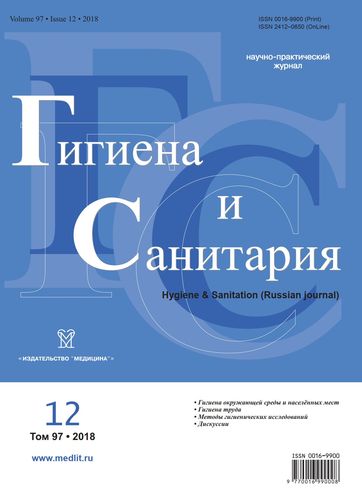The experience of joint work of the clinic of occupational pathology (center of occupational pathology) and the department of the scientific support of sanitary and epidemiological surveillance and expertise to establish the connection of diseases with the occupation
- Authors: Boiko I.V.1,2, Andreenko O.N.1, Grebenkov S.V.2, Shalukha A.S.1,2, Fedorov V.N.1,2, Orlova G.P.1,3
-
Affiliations:
- North-West Public Health Research Center
- I.I. Mechnikov North-Western State Medical University
- I.P. Pavlov First Saint Petersburg State Medical University
- Issue: Vol 97, No 12 (2018)
- Pages: 1239-1243
- Section: OCCUPATIONAL HYGIENE
- Published: 21.10.2020
- URL: https://rjsocmed.com/0016-9900/article/view/640525
- DOI: https://doi.org/10.47470/0016-9900-2018-97-12-1239-1243
- ID: 640525
Cite item
Full Text
Abstract
Introduction. The sanitary and hygienic characteristics of the patient’s working conditions made in accordance with the current regulatory documents do not contain an unambiguous conclusion about the adequacy of the occupational risk’s degree for an unambiguous justification of the relation of the disease with the occupation. In this situation a search for new methods which could help to recognize the risk degree is urgent.
Material and methods. As an example of a solution of this problem, two expert examinations are given: two patients, diagnosed adenocarcinoma of the lung and exogenous allergic alveolitis were observed in the Clinic of Occupational Pathology of North-West Public Health Research Center. The key aspect of this work was a refinement of the professional risk based on data specified in sanitary and hygienic characteristics of working conditions. The methods from the R 2.2.2006 - 05. “Guidance on hygienic assessment of working environment factors and working process. Criteria and classification of working conditions” were used.
Discussion. The use of the described methodology was suggested in cases when it’s necessary to estimate the effect of the combination of unidirectional substances and carcinogens in low-dose rates by the long-term exposure.
The participation of the occupational hygiene’s specialists in the expertise of the connection of the disease with the profession seems to be promisingly.
About the authors
Ivan V. Boiko
North-West Public Health Research Center; I.I. Mechnikov North-Western State Medical University
Author for correspondence.
Email: Ivan-Boiko@yandex.ru
ORCID iD: 0000-0003-4008-7393
MD, Ph.D., DSci., professor of the Occupational Medicine’s Department of the I.I. Mechnikov North-Western State Medical University, Saint Petersburg, 191015, Russian Federation.
e-mail: Ivan-Boiko@yandex.ru
Russian FederationO. N. Andreenko
North-West Public Health Research Center
Email: noemail@neicon.ru
ORCID iD: 0000-0001-9135-280X
Russian Federation
S. V. Grebenkov
I.I. Mechnikov North-Western State Medical University
Email: noemail@neicon.ru
ORCID iD: 0000-0002-7124-2504
Russian Federation
A. S. Shalukha
North-West Public Health Research Center; I.I. Mechnikov North-Western State Medical University
Email: noemail@neicon.ru
ORCID iD: 0000-0002-1786-6367
Russian Federation
V. N. Fedorov
North-West Public Health Research Center; I.I. Mechnikov North-Western State Medical University
Email: noemail@neicon.ru
ORCID iD: 0000-0003-1378-1232
Russian Federation
G. P. Orlova
North-West Public Health Research Center; I.P. Pavlov First Saint Petersburg State Medical University
Email: noemail@neicon.ru
ORCID iD: 0000-0002-3374-9320
Russian Federation
References
- Serebriakov P.V. Professional cancer of the bronchopulmonary system. In: Izmerov N.A., Chuchalin A.G. eds. Occupational diseases of the respiratory system. National Guidelines. Moscow: Goeter-Media. 2015: 649-668.
- Field R.W., Wither B.W. Occupational and Environmental Causes of Lung Cancer. Clin Chest Med. 2012. Dec; 33 (4): 681 - 703.
- Ilkovich M.M., Orlova G.P., Vasilieva O.S., Artemova L.V. Professional exogenous allergic alveolitis. In: Izmerov N.A., Chuchalin A.G. eds. Occupational diseases of the respiratory system. National Guidelines. Moscow: Goeter-Media. 2015: 506-529.
- Orlova G.P., Ilkovich M.M. Professional exogenous toxic alveolitis. In Izmerov N.A., Chuchalin A.G. eds. Occupational diseases of the respiratory system. National Guidelines. Moscow: Goeter-Media. 2015: 529-552.
- Quirce S., Vandenplas O., Campo P. et al. Occupational hypersensitivity pneumonitis: an EAACI position paper. Allergy.2016; 71:765-79.
- Spagnolo P., Rossi G., Cavazza A. et al. Hypersensitivity Pneumonitis: A Comprehensive Review. J Investig Allergol Clin Immunol. 2015; 25(4): 237-50.
- Ishizuka M., Miyazaki Y., Tateishi T., et al. Validation of inhalation provocation test in chronic birdrelated hypersensitivity pneumonitis and new prediction score. Ann Am Thorac Soc. 2015; 12: 167-73.
- Sharp C., McCabe M., Adamali H., Medford A.R. Use of transbronchial cryobiopsy in the diagnosis of interstitial lung disease-a systematic review and cost analysis. QJM. 2017; 110 (4): 207-14.
- Hanak V, Golbin JM, Ryu JH. Causes and presenting features in 85 consecutive patients with hypersensitivity pneumonitis. Mayo Clin Proc. 2007; 82 (7): 812-16.
- Elicker B.M., Jones K.D., Henry T.S., Collard H.R. Multidisciplinary Approach to Hypersensitivity Pneumonitis. J Thorac Imaging. 2016; 31(2): 92-103.
- Travis W.D., Costabel U., Hansell D.M. et al. An Official American Thoracic Society/European Respiratory Society Statement: Update of the International Multidisciplinary Classification of the Idiopathic Interstitial Pneumonias. Am J Respir Crit Care Med. 2013; 188(Iss.6): 733-48.
- Tsutsui T., Miyazaki Y., Kuramochi J. et all. The amount of avian antigen in household dust predicts the prognosis of chronic bird-related hypersensitivity pneumonitis. Ann Am Thorac Soc. 2015;12: 1013-21.
- Sforza G.G.R., Marinou A. Hypersensitivity pneumonitis: a complex lung disease. Clin Mol Allergy. 2017; 15: 6.
- Roslyj O. F., Slyshkina T.V., Roslaya N.A., Fedoruk A.A. Labor medicine in the production and processing of non-ferrous metals. Ekaterinburg. 2012; 223
Supplementary files









